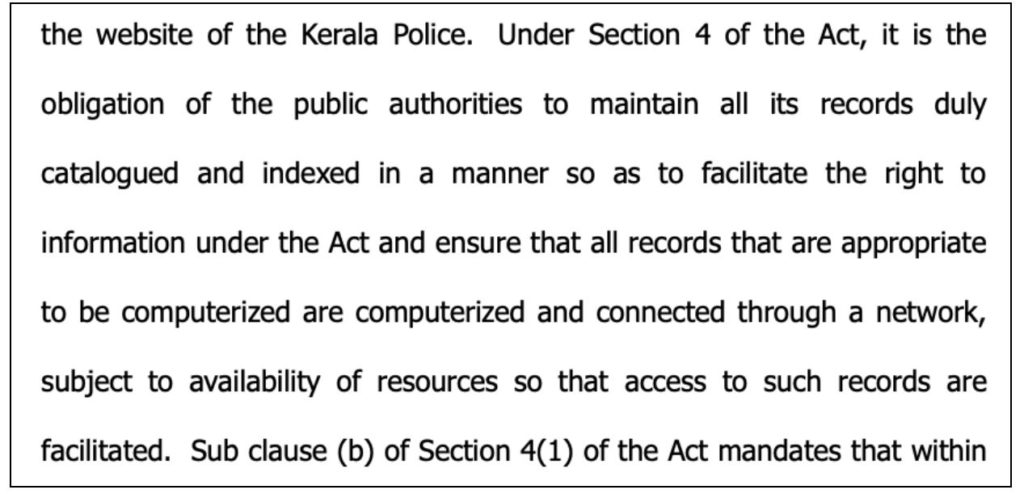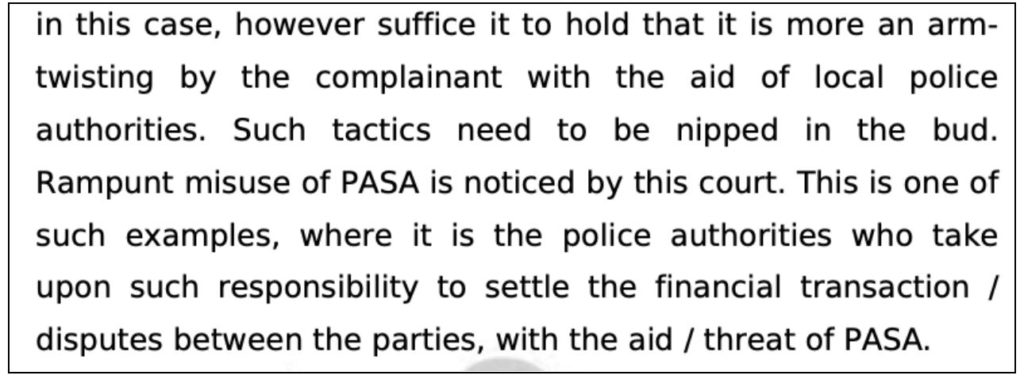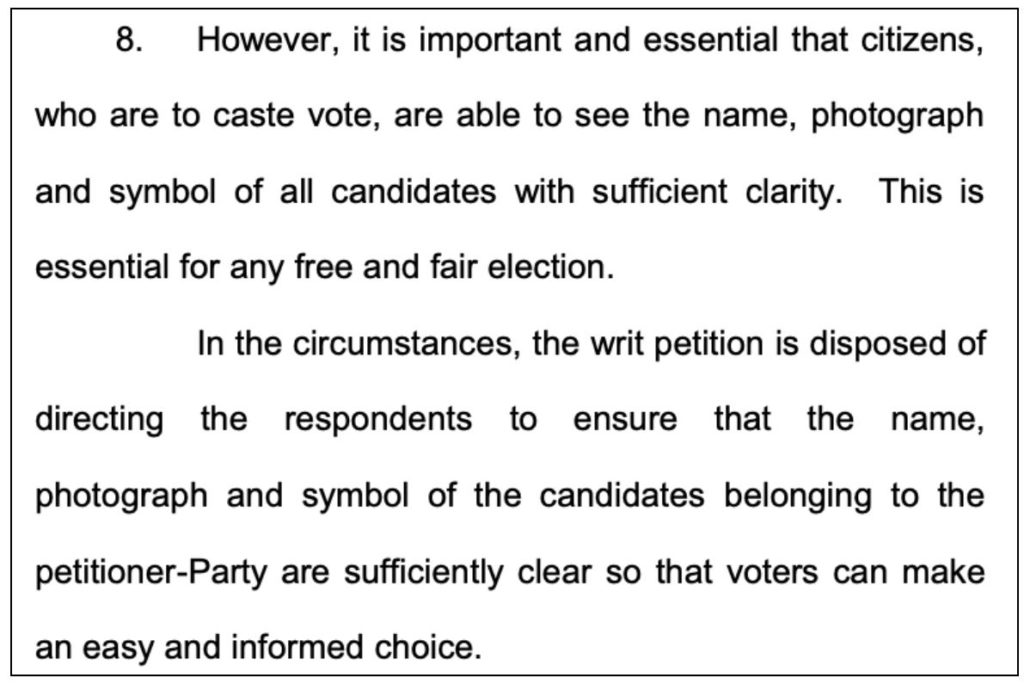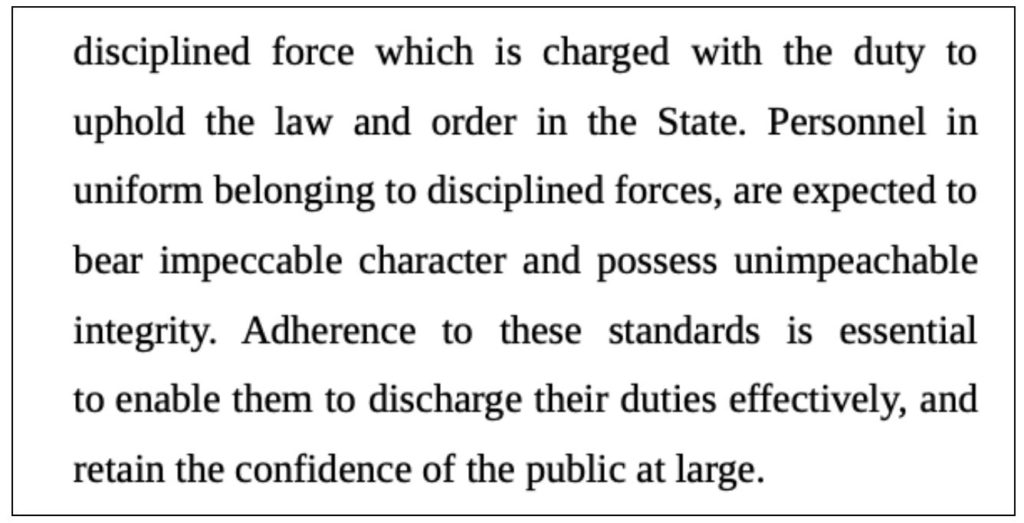In this roundup of the important court judgments, we look at directions about transparency and corruption charges, misuse of laws, free and fair elections, and selection of candidates with criminal antecedents.
Kerala HC: Publish details of police officers who have been found guilty of corruption or human rights violations on the official website
In the case State Public Information Officer & others vs. State Information Commission & Radhakrishnan R., the Kerala high court directed the Kerala Police to publish on its official website, the details of police officers who have been found guilty of corruption or human rights violations.
The court was hearing a petition filed by the ‘State Public Information Officer of the Crime Records Bureau’. The Information Officer moved the High Court challenging an order of the State Information Commission (SIC) which required police to publish details of corrupt officers found guilty in a court of law or dismissed from service on charges of corruption and human rights violations.
In 2010, the State Information Commission passed an order in an application filed by Radhakrishnan R., wherein he had sought the following information:
- Police officers in the State Police Department who are considered to be corrupt, the specific allegation against them, and the post that they were holding.
- Police officers in the State Police Department who are accused of committing atrocities against women, their name, rank, the post which they were holding, and the gist of allegations against them.
The State Information Commission reminded the State Police of its obligation as a public authority to maintain its records duly catalogued and indexed in order to facilitate information under Right to Information Act, 2005 (RTI). The state police were also to ensure that all records that are computerised within a period of 30 days from the date of order in January 2012 and connected through a network so that access to such records is facilitated.
Radhakrishnan R. was informed by the State Public Information Officer that the name and other details of the police officers facing corruption charges or human rights violations cannot be disclosed as the said information is exempted from disclosure under section 8(1)(j) and 8(1)(h) of the RTI Act. In the said circumstances, he approached the State Information Commission and filed an appeal. The State Information Commissioner came to the conclusion that the information sought by the party respondent under cannot be denied relying on Section 24(4) of the RTI Act. The Commission, after perusal of the records, held that the information sought for by the applicant should be disclosed. Directions were issued to segregate the cases accordingly and to publish the information on the website of the Kerala Police as provided under Section 4 of the RTI Act in order to enable every citizen to have access to the said information from the website. This order was challenged in the present petition filed by the State Public Information Officer of the Crime Records Bureau.

The Bench of Justice Raja Vijayaraghavan held that the information authority cannot shield the name of those officers who have been found guilty or were dismissed from service on charges of corruption or human rights violations. However, the information authority under the Police department will not be obliged to publish the names of such officers against whom the offenses have been established on the investigation, but a conclusive finding has not been arrived at by a court of law.
The judgement emphasized that the information authority has to bear in mind that while dealing with information not falling within Section 4(1)(b) and (c) of the Act, the authorities cannot read the exemptions in a restrictive manner. Rather, the section was to be read in a practical manner so as to preserve public interest, the Court stated.
Gujarat HC: Rampant misuse of PASA Act has to be stopped
In the case Rohitbhai Laxmibhai Luni vs. Commissioner of Police, Surat, the Gujarat high court held that rampant misuse of PASA Act has been noted and strongly held that such tactics need to be nipped in the bud.
The court was hearing an application filed by the Petitioner apprehending his detention under Gujarat Prevention of Anti-social Activities (PASA) Act in connection to the offence of kidnapping/ extortion.
Upon examining the details of the case, the high court observed that the present case is certainly not where the petitioner could be termed as a dangerous person within the meaning of Section 2(c) of the PASA. Section 2(c) of the PASA defines a dangerous person as anyone, who either by himself or as a member of a gang, habitually commits punishable offences. It was, in fact, a private dispute between few individuals with respect to personal financial transactions. The readiness of the police to detain the petitioner under the PASA Act in connection to the offence is an arm- twisting attempt by the complainant with the aid of local police authorities, as per the court.

The bench of Justice Paresh Upadhyay opined that rampant misuse of PASA has been noted and strongly held that such tactics need to be nipped in the bud. This case was one of such examples, where the police authorities took up the responsibility to settle the financial transaction/disputes between the parties with the threat of PASA.
In conclusion, the judgement granted interim protection to the petitioner from any coercive action by holding that in case a detention order under the PASA Act is passed against him, then it shall not be executed for a period of one month from the date of service of such an order.
Kerala HC: Voters should be able to see, with sufficient clarity, the name, photograph and symbol of candidates for free and fair elections.
In the case Twenty 20 Party vs. Election Commission of India & Ors., the Kerala high court held that voters should be able to see, with sufficient clarity, the name, photograph and symbol of candidates for free and fair elections.
The petitioner i.e., Twenty 20 Party is a registered unrecognised political party under Section 29A of the Representation of the People Act, 1951. The party claimed that the name, photograph and symbol of their candidates not clear and visible on the electronic voting machine in Kothamangalam, Thrikkakkara and Vypin Assembly Constituencies. The petitioner contended that the respondents have not treated all candidates with equal importance.
In response, the Standing Counsel for the Election Commission submitted a photograph of the EVMs in use and argued that the party’s symbol was clear and visible on the EVM. It was also submitted that any direction from the court would interfere with the free flow of the election.
Upon examining all submissions, the bench of Justice N. Nagaresh reasoned that since the election is scheduled for 06 April 2021, any direction that may be given to the respondents at this stage is likely to slow down the election process.

Under such circumstances, Court stated that it was disposing of the petition directing the Commission to ensure that the name, photograph and symbol of the candidates belonging to the petitioner-Party are sufficiently clear so that voters can make an easy and informed choice.
Allahabad HC: Laid down procedure to be adopted by competent authority for inquiring into the criminal antecedents of a candidate for selection.
In the case Sanny Kumar vs. State of UP, the Allahabad high court laid down the procedure to be adopted by the competent authority for inquiring into the criminal antecedents of a candidate for the purpose of selection.
The high court was hearing a writ petition filed by Sanny Kumar, who was aggrieved by an order passed by the Superintendent of Police (SP), Jalaun, cancelling his selection as Constable in the UP Police, in the backdrop of several criminal cases pending against him.
The petitioner contended that he had truthfully declared details of all the criminal cases pending against him in the affidavit of verification. The petitioner has not been charged in either of the two cases and one of the cases is an offshoot of a matrimonial dispute of his brother. The petitioner claimed that the order passed by the SP has overlooked the acquittal of the petitioner by the court in one criminal case. It was also contended that the authority has not adopted any standard of evidence while considering the material against the petitioner.
In response, the Standing Counsel for the State of U.P. submitted that the petitioner was not acquitted honourably by the trial court in the first case. The petitioner was named in the first information reports lodged in the other cases including one for an act of moral turpitude. The counsel argued that although the Investigation Officer (IO) did not file a charge sheet against the petitioner, it does not exonerate the petitioner, particularly, when trials are on foot. Hence, persons with such criminal profiles are not fit for appointment in the police force.
Upon examining all submissions, the bench of Justice Ajay Bhanot observed that criminal antecedents are accepted in law as reliable guides for an employer to assess character traits and evaluate the suitability of a candidate for appointment. The police are a disciplined force that is charged with the duty to uphold the law and order in the State. Personnel in uniform belonging to disciplined forces, are expected to bear impeccable character and possess unimpeachable integrity.

In terms of examination of suitability of candidates for appointment, the judgement laid down the following broad principles.
- Material for formation of opinion before the authority
The bench noted that the material available before an authority to determine the suitability of a candidate may be either reliable and conclusive, or credible but probative. However, both kinds of material are liable to be considered. The full inventory of material before the authority includes the F.I.R., the evidence collected during the criminal investigation, charge sheet submitted in court, evidence emerging during the trial, the judgment rendered by a court of law. On the foot of such material, the competent authority can make its decision on the fitness of the candidate for appointment.
- Nature of proceedings
The judgement describes that the determination of the suitability of a candidate for an appointment is an administrative decision that is part of the recruitment process. The process of evaluating suitability for an appointment is not an adjudication of guilt or innocence as in a criminal case.
- Standard of evidence & Impact of charge sheet
The judgement holds that the competent authority is not always bound by the findings of the court, nor is it invariably constrained by the opinion of the investigation officer. The reasons are not far to seek. The authority while determining the suitability of a candidate for public employment is not required to reach the level of evidentiary standards demanded of the prosecution in a criminal trial or asked of a party in a civil trial or required of a department in a disciplinary enquiry.
- Procedure for enquiry
The judgement opines that the conclusion of the competent authority is an estimation at best. The decision made by inferences drawn from the material in the records, by its very nature can never be proved by mathematical accuracy. However, to obviate possibilities of a miscarriage of justice, judicial safeguards have to be built into the decision-making process. Therefore, the authority has to adopt a procedure that is consistent with principles of natural justice.
Keeping these principals in light, the bench observed that the SP’s order need not be interfered with for the following reasons:
- There is no procedural impropriety committed by the authority while passing the order.
- The procedure adopted by the competent authority while passing the order is compliant with principles of natural justice.
- The petitioner was not acquitted honourably by the trial court in the first case.
- The case was not an isolated one. The petitioner was an accused in the FIR in a grave offence involving moral turpitude and the trial is underway.
- Allegations of sexual offences against children are most serious and cannot be lightly dismissed by any employer.
- These facts are liable to be factored in the decision and were legitimately considered in the order.
Featured Image: Important Court Decisions


